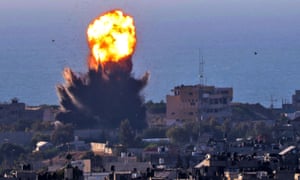Are Israel and Palestine on the brink of another war?
Oliver Holmes, the Guardian’s Jerusalem correspondent, discusses what has prompted the worst unrest in Israel and Palestine since 2014
Oliver Holmes, the Guardian’s Jerusalem correspondent, talks to Rachel Humphreys about the violence that has broken out between Israel and Palestine. In recent weeks there has been a sharp escalation in anger over Israel’s half-century occupation, its ever-deepening military grip over Palestinian life and a wave of evictions and demolitions. In Jerusalem, hundreds of Palestinians have been wounded in near-nightly protests that escalated over the weekend and spread to other areas of Israel and the occupied West Bank. Following weeks of intense violence in Jerusalem, Hamas, the Islamist group that holds power inside Gaza, fired a barrage of rockets towards Jerusalem on Monday evening. Since then, it has launched hundreds more at Israeli towns nearby, and Israel has conducted dozens of airstrikes, including hits on residential buildings. More than 80 people, including at least 17 children, have been killed in Gaza, according to the health ministry. In Israel, seven people, including two children, have been killed.
Israel’s political leaders have said violent street clashes between Jews and Arabs inside the country pose a bigger threat than the escalating military conflict with Gaza. Despite international calls for calm, there are fears that Israel and Palestine are on the verge of another war.
Archive: CNBC; Twitter; Kan - Israel Public Broadcasting; Al Jazeera; BBC News; CN International; The Sun; Global News; DW News; Sky News; Ruptly; NBC News; TPS; Daily Mail

The Guardian is editorially independent. And we want to keep our journalism open and accessible to all. But we increasingly need our readers to fund our work.
Support The Guardian